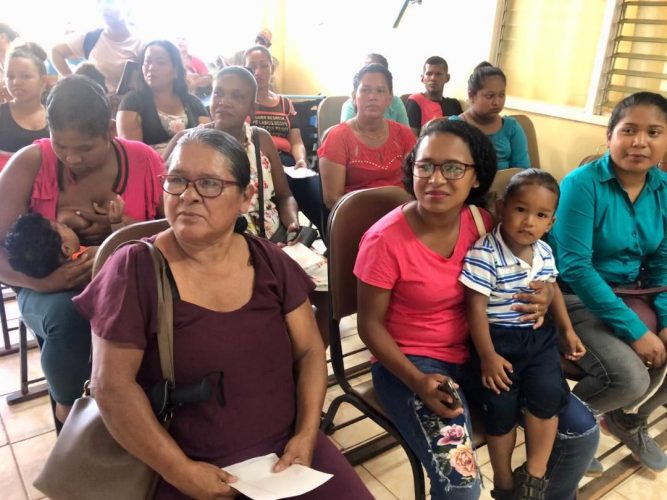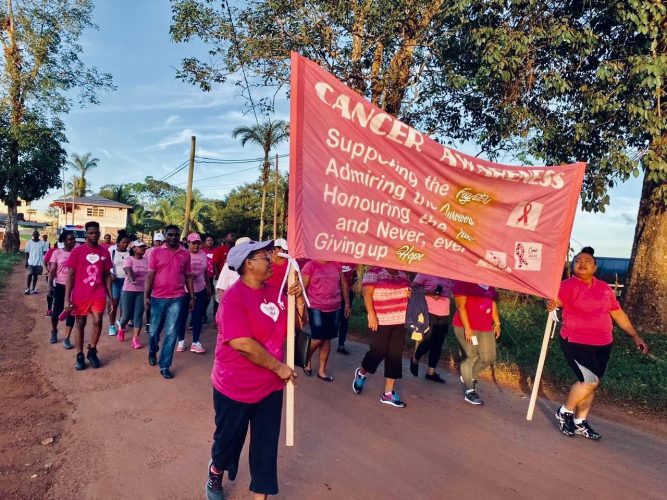Iris December of Mabaruma Township, North West District, lost a cousin to cervical cancer two years ago so when the Cancer Institute of Guyana (CIG) took its two-day cervical cancer outreach to the Mabaruma Hospital last week, she made an effort to be there.
The CIG conducted a screening campaign through pap smears so that the cancer can be detected and treated at early stage. The campaigns target low-income women living in remote areas of Guyana; Region 1 (Mabaruma, Moruca & Port Kaituma), Region 7 (Bartica), Region 8 (Mahdia) and Region 9 (Lethem, Rupununi).
They are being held in collaboration with the Healthy Caribbean Coalition (HCC).

This is through a Memorandum of Understanding that the two entities had signed to implement further activities under the Healthy Caribbean Coalition’s Caribbean Civil Society Cervical Cancer Prevention Initiative (C4PI) – 2019.Direct Aid Programme (DAP) of the Australian High Commission in Trinidad & Tobago funded the regional initiative.The woman recalled that her cousin never knew she had cancer until she developed a severe bleeding and she decided to visit the hospital.
She was then referred to the Georgetown Public Hospital Corporation (GPHC) where she was diagnosed with stage four cervical cancer. She received treatment but died about one year later. This got December more conscious about taking care of her health and she looks forward for the CIG team coming to her area to conduct the screening.
She said it would cost a lot for her and the women in her community to travel to Georgetown to be screened. Besides, she said, “we don’t even know town and we don’t know where to go.”
In the past she benefited from VIA – visual inspection with acetic acid – screening that the government provides.
At the start of the campaign, Outreach Director of the CIG, Dr. Syed Ghazi encouraged the women to ensure they are screened so that they can join together in eliminating cervical cancer. He also urged them to go back and tell their neighbours and friends about the importance of being screened so that they too can benefit from the exercise.
He said the VIA tests are good and more economical for the government but Pap smears are the gold tests in detecting cervical cancer, which is caused by HPV -human papilloma virus.
Oncologist, Dr. Sayan Chakraborty said the CIG offers follow-up services for patients with malignant and certain benign diseases.

He said too: “Cancer is a disease that affects every part of your body…” Pap smear involves taking cells from the cervix, which is the lowest part of the womb. The procedure, he said, is simple and does not cause much discomfort.Chief Medical Officer, Dr. Shamdeo Persaud who was in the area along with other doctors to conduct Continuing Medical Education (CME) sessions, commended the CIG for the initiative and told the women to make use of the opportunity.
He also said young girls between the ages of nine and 16 years old should take the vaccines against HPV as it would be a protection for the future.
He said the vaccines are available free of charge and that the government now has for boys as well. Most of the women who turned out said they heard about the screening exercise through an announcement on Radio Mabaruma.Elizabeth Anicetus, 56, told this newspaper that she came out to “do the pap smear to make sure I don’t have cancer.”
She mentioned the case of a good friend whom she visited one day and noticed that one of her breasts appeared to be swollen. She questioned her about it and her friend told her to “come and feel it and it felt hard like a rock and blood was coming out. She knew about it but she was afraid to go and check it out.”
Anicetus encouraged her friend to go to the Mabaruma Hospital. She was then referred to the Georgetown Public Hospital Corporation (GPHC) where doctors diagnosed her with cancer and recommended surgery to remove the breast.
But she refused to have the surgery saying “she come like this (with both breasts) and would go back like this.” She returned to Mabaruma and died one week later.
Isabella Moonsamny of Hosororo Hill heard about the outreach from a neighbour and she rushed over to the hospital to get screened.
Her mother was 71-years-old when she was diagnosed with uterine cancer 10 years ago. She only realized something was wrong when she developed a severe bleeding and had a fever.
By then the cancer had already reached stage four and she died a few months later.
Orleen Williams, 34, travelled from Red Hill in Barima River, 70 miles away. It took her two hours to get to the outreach.
“I never had a Pap smear done. My cousin heard about it and the way she explained it to me I decided to come and get it done.
It is better to know if something is wrong so you can get treated early,” she said.
Breast cancer walk
Meanwhile, Dr. Ghazi and Dr. Persaud also joined in a breast cancer awareness walk that started from Mabaruma early last Sunday morning.
Dr. Ghazi told the participants at the end of the walk that “Cancer is a monster that does not see cast, colour or creed and can hit anybody, anytime, anywhere when they least expect.”
According to him, the campaign in Mabaruma just happened to fall in Breast Cancer Awareness month but the fight for all cancers is every-day.
He also told the gathering that 1.4 million people in the Americas die of cancer every year. Out of that 94,000 die of breast cancer and 36,000 die of cervical cancer.
“The CIG does not want anyone to be part of that statistic. We want to save people. That’s why we’re out there fighting this monster called cancer,” Dr. Ghazi said.
In brief remarks, Dr. Persaud said that almost everyone must have lost someone to cancer.
He said that one way to beat cancers and other non-communicable diseases, like diabetes and hypertension is to eat healthy.
Another way, he said, is to quit bad habits like smoking, which is linked to certain cancers including breast cancer.
He also said that the Mabaruma Hospital is providing many services and that they should use it to the fullest.
Dr. Persaud said diseases are no longer seen as a stigma but as conditions we should embrace.
“If you know someone who is affected by any disease you should reach out a hand and help in some way,” he said.










